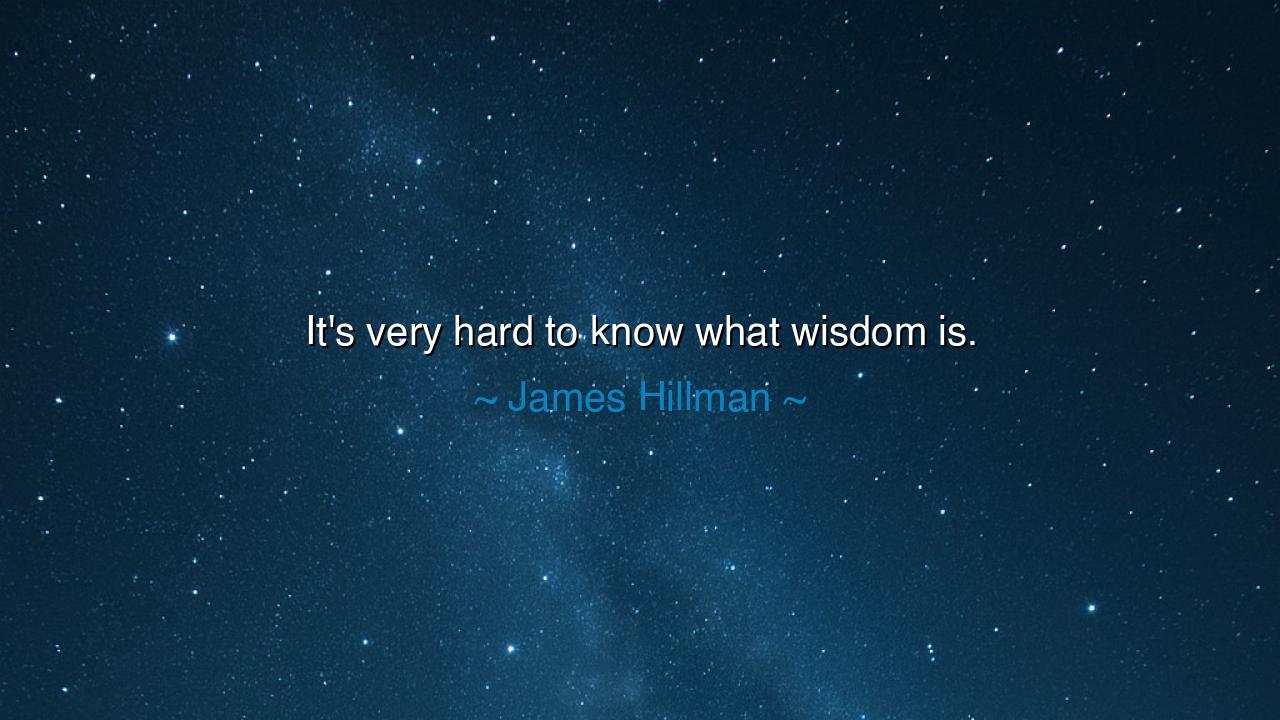
It's very hard to know what wisdom is.






James Hillman, depth psychologist and pilgrim of the soul, spoke with disarming candor: “It’s very hard to know what wisdom is.” In this brief confession lies an ocean of truth. For men have sought to define wisdom since the dawn of thought, yet every age, every teacher, and every people have given it a different form. One calls it knowledge, another virtue, another balance of mind; yet when we reach for it, it slips through our fingers like water.
The meaning is not despair but humility. Hillman reminds us that wisdom is not a fixed stone but a living flame, always moving, always shifting. To know what it is requires us to admit that we cannot fully grasp it. Those who loudly claim to possess wisdom are often the farthest from it, while those who confess their uncertainty—like Hillman—may be closest. For to seek wisdom is itself a sign of wisdom, but to claim it with certainty is folly.
History gives us the figure of Socrates, who declared that he was the wisest of men only because he knew that he knew nothing. The Athenians sought cleverness, rhetoric, and certainty; Socrates offered only questions. For him too, it was “very hard to know what wisdom is.” Yet by admitting his ignorance, he opened a path for others to search. His death became the greatest testimony: that true wisdom lies not in answers, but in the unyielding pursuit of truth.
This struggle also humbles the proud achievements of mankind. Kingdoms have risen with their doctrines of “wisdom,” only to crumble when time revealed their blindness. Philosophers, scientists, and leaders alike have proclaimed certainty, yet the march of history exposed their errors. Hillman’s words remind us to walk gently, to recognize that our vision is partial, our understanding finite, and the eternal mystery greater than any single definition.
Therefore, let the seeker take this teaching to heart: do not be discouraged that wisdom is hard to know, for it is meant to be pursued, not possessed. Every question asked, every lesson learned, every act of humility brings us closer to it. And perhaps the greatest wisdom is this—to recognize that we stand always at the threshold, students of a truth too vast to own, yet blessed to seek it all the days of our lives.






ADNguyen Pham Anh Dong
As a reader, I find this statement both frustrating and liberating. Frustrating because it suggests that wisdom—the very thing we strive for—might be unknowable. Liberating because it reminds us that not knowing doesn’t mean failure; it means openness. Maybe wisdom is more about perception than definition, more about awareness than conclusion. It makes me wonder if true wisdom is simply the realization of how little we actually understand.
VKVy Khanh
This quote resonates with me because it challenges the assumption that wisdom is an attainable goal. If even thinkers struggle to define it, maybe wisdom isn’t a possession but a relationship with truth and doubt. Could it be that wisdom lies precisely in accepting uncertainty rather than claiming certainty? I find that idea strangely comforting—it suggests that questioning and reflection might be wiser than pretending to have answers.
HNHoa Nguyen
I find this quote humbling because it admits uncertainty about something we all claim to value. Everyone talks about seeking wisdom, but few can describe what it really is. Does wisdom come from intellect, or from emotional understanding? Or is it simply the ability to act rightly in complex situations? The more I think about it, the more it seems that wisdom can’t be defined—it can only be recognized in hindsight.
KLKhoi lucky
This statement feels deceptively simple but incredibly deep. It makes me wonder—how do we actually define wisdom? Is it knowledge, experience, empathy, or something spiritual? Sometimes what seems wise in one moment feels foolish in another. Maybe wisdom isn’t a fixed state but a process of continual reflection and humility. I’d love to hear Hillman’s view on whether wisdom can ever be truly known, or only lived through experience.